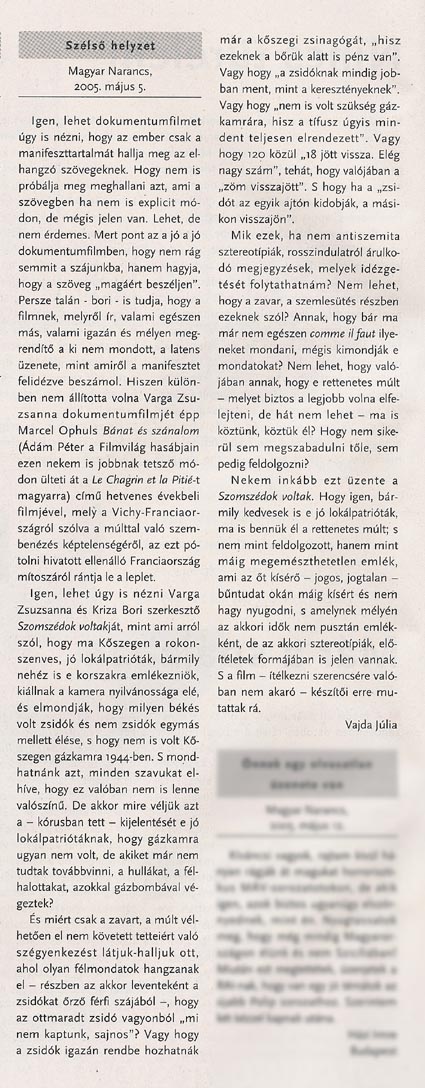
On the Sidelines (Commentary)
By Júlia Vajda
May 19, 2005, in Magyar Narancs
Yes, it's possible to go see a documentary, and to hear only the literal content of what is said on film. It's possible to view a film without making any effort to hear what is being said "between the lines." You can see a film in that way, but it's not worth it. A good documentary doesn't beat you over the head with a message - instead, it lets the text speak for itself. Perhaps [borie] knows that the film she has reviewed is something entirely different from the direct quotes she has cited; that the film's unspoken, latent message is something truly and deeply affecting. She must know this, otherwise she would not have compared Zsuzsanna Varga's documentary to Marcel Ophuls' 1971 epic, "The Sorrow and the Pity," which, with its focus on Vichy France, is about the impossibility of facing up to the past, and exposes the myth of the French resistance, which was created to compensate for this failure.
Indeed, you can see "Once They Were Neighbours," Zsuzsanna Varga's film with reporter Bori Kriza, as simply the collection of stories it presents: today, the good citizens of Koszeg, are willing - as hard as it is to think back on that terrible era - to go on record to say that Jews and Christians had lived peacefully side by side, and that there is no truth to the rumor that Koszeg had its own gas chamber in 1944. And we, believing their every word, might well agree that a gas chamber is unlikely indeed. But then what are we to make of these good citizens' statement - given in unison - that while there was no gas chamber, those victims who could not be transported any further - the corpses, those who were practically dead already - were gassed on site?
And why do we discern an embarrassed shame for past sins (presumably never committed) only in incomplete sentences - such as those of the Levente assigned to guard the Jews - who referred to the property the deported Jews left behind: "we never got any of it, unfortunately. " Or another remark to the effect that the Jews really ought to restore the synagogue in Koszeg: "after all, they're made of money." Or that "the Jews in our town were always better off than the Christians." Or that "there was no need for a gas chamber, because typhoid fever took care of everything." Or that of 120 deported individuals, "18 returned. Not so bad, number-wise," and that "the core did come back." Or that "if you throw a Jew out the door, he'll just come in another one."
I could go on. What are these statements, if not anti-Semitic stereotypes and expressions of animosity? Isn't it possible that the embarrassment, the reluctance to make eye contact, is engendered by these sentiments? Even though the witnesses know that, today, it's no longer quite politically correct to say such things, they say them anyway. Couldn't it be that this shame is really a reaction to the fact that this terrible history - which would be better to forget, but that's not possible - is still with them, and with us? And the fact that it has not been possible to either be rid of this history or to come to terms with it?
For me, this was the message of "Once They Were Neighbours:" no matter how pleasant these good citizens are, the horrors of the past are with them still - not as a past experience they have learned to deal with, but as an unprocessed, unfathomed recollection. The accompanying sense of guilt (whether warranted or not) haunts them still and does not let them rest. The experience of those times lives on - not just as a memory, but in the form of persistent stereotypes and prejudices. It is this which the filmmakers, without any intention of passing judgment, have put their finger on.

